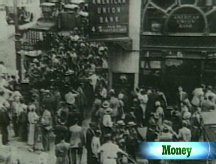Dollar falls on Citi bailout
Investors gain confidence in equities, and retreat from the buck, as the government pumps billions into the troubled bank.
NEW YORK (CNNMoney.com) -- The dollar weakened versus the euro and pound Monday, after the government promised billions in loans and guarantees to a troubled Citigroup, sending investors back to the stock markets.
The dollar sank against the 15-nation euro, which jumped 3.6 cents to $1.295 from $1.259 late Friday. The dollar also lost ground against the British pound, which rose 2.6 cents to $1.518 from $1.492, but rose ¥1.51 to ¥97.36 against the Japanese yen.
News of the government bailout sent equity markets into a rally, with the Dow Jones industrial average rising more than 6%, encouraging more investment money to flow toward stocks.
"The equity market appears to be leading the currency market around by the ear," said Stephen Malyon, currency strategist with Scotia Capital in Toronto.
Citi bailout: In its latest effort to stabilize the financial markets, the government said the U.S. Treasury and the Federal Deposit Insurance Corporation will guarantee more than $300 billion of Citigroup's assets and invest an additional $20 billion on top of the $25 billion already part of the government's $700 billion bailout program passed by Congress in October.
The massive bailout of Citigroup (C, Fortune 500) sent shares of the company soaring and injected optimism into the stock markets, prompting investors to sell off the dollar to purchase assets denominated in euros and pounds.
President Bush said he had spoken with President-elect Barack Obama about the Citigroup bailout decision and would continue to keep the Obama's transition team in the loop.
"It's important for the American people to know that there is close cooperation," President Bush said Monday.
Next econ team: Obama also bolstered stocks - in the process hurting the dollar against the European currencies - by officially announcing his economic team, headed by New York Federal Reserve President Timothy Geithner, who will succeed Henry Paulson as Treasury secretary.
Over the past several weeks, the dollar had been gaining on the euro and pound, as investors sought the shelter of the U.S.-backed dollar against the falling equity markets.
"I do think [the dollar rally is] going to reassert itself," said Malyon. The economy is still experiencing the early pangs of a lasting recession, he added.
Economic news remains largely negative, with sales of existing homes continuing their tumble in October, and the failure of the automobile industry to return from hearings on Capitol Hill last week with an industry bailout.
"I still think we're in the midst of a deleveraging process. We're likely to see further pressure on risk assets [such as stocks] in general," Malyon said. ![]()



